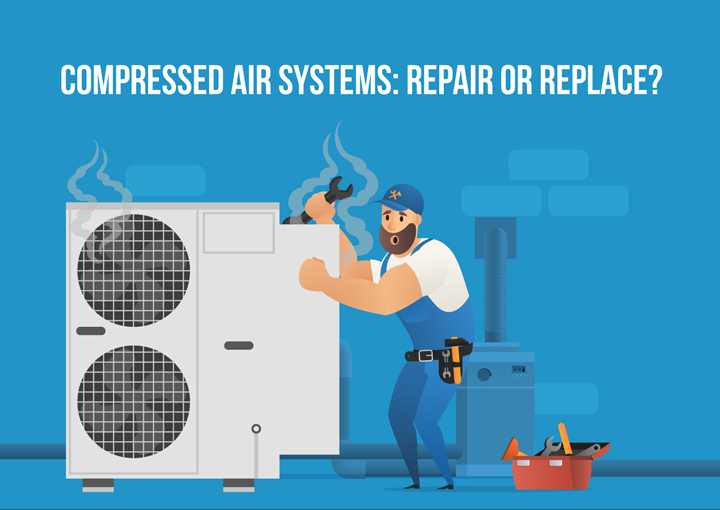
Air compressors are workhorses that can provide good service for 20 or 30 years. But if your system is out of commission or limping along, you may be wondering if you should fix it or invest in a new compressor. Start by asking yourself these questions:

Is your compressed air system rated output <40 HP?
Smaller compressed air systems are typically not worth repairing.

Is your system drawing more than 25 kW of power per 100 cfm of output?
Most efficient systems draw between 16 and 22 kW per 100 cfm (cubic feet per minute) of output.

Has the system broken down more than once in the last 12 months?
Frequent breakdowns indicate serious problems that may not be easy to fix.

Is your compressed air system more than 20 years old?
Older systems have more points of failure. Advances in technology make new compressors very attractive.

Is your system regularly operating at less than 60% of rated load or short cycling?
This is a sign that your system is oversized. Motor efficiency is greatly reduced at low load conditions.

Is your compressor running more than 80% of the time during normal work hours?
Excessive operation indicates there is not enough capacity to meet demand. A larger compressor will better support operations.

Is it difficult to find replacement parts?
Inventories of parts for older units are dwindling and manufacturers better support new units. The cost of downtime is high.

Is the oil content in delivered air too high?
While oil-free compressors still allow oil vapor in the air, high levels indicate a serious problem.
You answered yes to 0 out of 8 questions.
If you answered yes to most of these questions, it’s probably time to replace the compressed air components. Remember, the purchase price of a new compressor is less than 10% of the total lifetime cost of a system; the cost of electricity is the major expense (around 75%).
So, it is usually worth replacing an old, inefficient compressor with a new, more efficient compressor.
